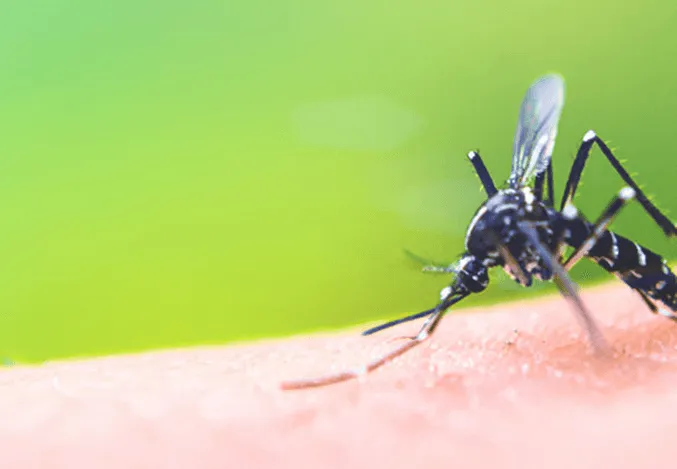Buy Malaria Treatment Online
Your final treatment will be decided by our prescribers based on your medical assessment. You will be asked to select a treatment option from a list after completion of your medical assessment.
What is Malaria?
Malaria is a serious tropical disease spread by mosquitoes. It cannot be passed directly between people. Female mosquitoes pick up and spread the disease by drawing blood from infected humans. Therefore, protecting yourself from malaria is important for your own health and for other travellers.
Malaria develops in humans and other animals when they are bitten by a mosquito infected with the Plasmodium parasite. Once you've been bitten by an infected mosquito, the parasites get into your liver and red blood cells. Then they grow and multiply.
Can I buy anti-malaria tablets online?
Yes! You can buy malaria tablets online. First, book an appointment with your GP or an online consultation with one of our experts at Click Pharmacy. There are different types of medicines available. The doctor will need to find out about you and your situation to prescribe the best one for you.
In what countries should you take malaria tablets?
Malaria is avoidable, treatable and curable. However, because it spreads quickly in tropical and subtropical areas, there are 87 countries around the world where you can get malaria. Most of these are in Africa, Asia and the Americas. In 2022, Africa had the most cases (94%) and the most deaths from malaria (95%) according to the WHO. In some countries, the disease has become resistant to certain drugs. For this reason, you should get advice from specialists to make sure you're fully protected when you visit a country affected by malaria.
NHS Fit for Travel has a full list of countries and areas where you may need to take malaria tablets.
How long do you take malaria tablets for?
Different medicines are used in different ways for malaria prevention and treatment. Also, the tablets come in different doses. How to take them depends on which medicine your doctor prescribes, where you are going and for how long. Taken properly, malaria prevention tablets can seriously reduce your malaria risk. Always seek medical advice on when to start taking malaria tablets, how many to take and when to stop. Ask your GP or book a consultation with our online doctor service to get the medical information you need.
Doxycycline
-
Prevention. Take a 100mg doxycycline tablet every day, covering:
-
At least 1 to 2 days before you travel to a high-risk area
-
Every day of your stay in the area
-
And the next 28 days after the end of your stay
-
-
Treatment. Take a 100mg doxycycline tablet twice a day for 7 days.
Lariam (mefloquine)
-
Prevention: Take a 250mg Lariam tablet once a week, covering:
-
1 to 3 weeks before travel
-
Every week of your stay
-
The next 4 weeks after you leave the area
-
-
Treatment: Take 1250mg as a single dose.
Malarone (atovaquone and proguanil)
-
Prevention. Take a 250/100mg Malarone tablet every day, covering:
-
1 to 2 days before visiting a malaria-prone area
-
Every day of your stay
-
And the next 7 days after you leave
-
-
Treatment. Take four 250/100mg Malarone tablets once a day for 3 days.
What are the symptoms of malaria?
Malaria can get worse very quickly. So if you have symptoms, keep a close eye on them. You might start to feel better, but your symptoms may come back and get even worse. Symptoms of malaria include:
-
Chills and shaking
-
Sweating and a high fever
-
Headaches
-
Feeling sick and vomiting
-
Stomach pain
-
Diarrhoea
-
Muscle pain and convulsions
-
Drowsiness and weakness
Cerebral malaria is a rare but very serious issue, where small blood vessels leading to the brain get blocked. This can cause seizures and brain damage, or even cause a coma.
How do malaria tablets work?
Once you are infected, malaria tablets work by targeting the Plasmodium parasite at different stages of its life cycle. The type of treatment you need will depend on a lot of things, including:
-
Where you are or have been
-
Any allergies you may have
-
Any medicines you are taking
-
Your age
-
Whether you are pregnant
As well as stopping you from getting infected, anti-malaria tablets are designed to stop the infection from developing once it's in your bloodstream. To find the best treatment for you, talk to your GP or one of our online doctors at Click Pharmacy for help and advice to order malaria tablets.
Malaria treatment
If you have malaria, treatment should start as soon as possible. Various medicines are available. For example, your doctor may prescribe Malarone (atovaquone/proguanil hydrochloride), doxycycline or Lariam (mefloquine). Treatment typically lasts for 7 to 14 days, depending on the specific medicine and how bad the infection is.
To avoid complications and make sure you get better, prompt treatment is vital. So make sure to see a doctor for a proper diagnosis and to determine the best treatment for your situation. Our online pharmacy experts are available for consultation.
Which malaria tablets should you choose?
For prevention, which tablets you need will depend on the country you are visiting. You can check the Fit For Travel website to look up your destination and see which malaria tablets are recommended. This will also help you identify which active ingredients are effective against malaria in the region. If you’re travelling through multiple countries or different parts of a country, you may need more than one type of tablet for full protection.
How can I prevent malaria?
There are steps you can take to prevent malaria. Health experts often recommend the ABCD approach. This can greatly reduce your chances of catching malaria.
-
Awareness of risk: Before travelling, research whether your destination carries any risk of malaria.
-
Bite prevention: Always take measures to avoid mosquito bites. These include using insect repellent, mosquito nets and wearing long loose clothing.
-
Check whether you need to take malaria tablets: If you are travelling to a malaria risk zone, you should take antimalarial tablets. Make sure that you know how much to take and when.
-
Get diagnosed: Read up on malaria symptoms. If you have any of them, seek medical help straight away.
More things you can do to prevent malaria on your travels include:
-
Avoid going out at night: Most mosquitoes that carry malaria feed at night. This means they're most active during the evening, so you're more likely to be bitten then.
-
Use strong mosquito repellents: During both the day and night, apply a strong mosquito repellent.
-
Wear preventative clothing: Wear long-sleeved cotton shirts and full-length bottoms to keep mosquitoes away from your skin.
-
Sleep under protective nets: Douse the nets with insecticides, and make sure to surround yourself with insect repellents.
How to order
Order your Anti Malarials medication in a few clicks. Ordering from us is easy, fast and discreet.
Free Online Assessment
Answer a few simple questions about your health.
Choose Your Medication
Our prescribers will review and guide you to the right treatment.
Fast Delivery
Once approved, your treatment is dispatched discreet packaging by next day delivery.

